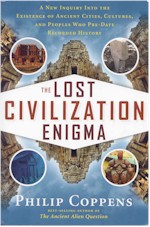 |
|
|
| ||||||
|
|
This page is the original source of this review, though you may also find it on Amazon or other sites. | ||
| Book Reviews Home | Free Audio Books | |
 |
Book Review of: The Lost Civilization EnigmaA New Inquiry Into the Existence of Ancient Cities, Cultures, and Peoples Who Pre-Date Recorded History Price: $12.69 Availability: Usually ships within 24 hours |
| Review of
The Lost Civilization Enigma, by Philip Coppens (Softcover, 2012) (You can print this review in landscape mode, if you want a hardcopy) Reviewer: Mark Lamendola, author of over 6,000 articles. This is yet another interesting book by Coppens. Before reviewing this specific work, here are some comments about Coppens' work in general. Coppens is one of a fairly small number of amateur (or non-academically credentialed) experts who write about historical evidence and theory that are largely unaccepted by mainstream archaeologists. Some of the writers in this field aren't scientific and take a mistaken viewpoint. They have an existing idea and cherry pick facts (or use bad information) to support that viewpoint. It's understandable that's the establishment rejects them (yet, amazingly, it does the same thing!).
Coppens isn't one of those writers. He works hard to examine the evidence and he tends to evaluate the likeliness of this or that conclusion. Nor does he position himself as a contrarian who must agree with anything the establishment doesn't like. In fact, he looks at some alternative theories or conclusions and explains why they can't be right. This objectivity is apparently badly needed in archaeology today. What's missing in his work, and in the work of others outside the mainstream, is "the other side of the argument." For example, if a PhD archaeologist takes exception to something, I would like to see that person's explanation for why. What we get in Coppens works instead is a third-person highlight of points with no information as to why those points were made (some exceptions do exist to this pattern). If you're going to make a debate out of something, then you need to represent both sides of the debate. Now, on to this book. It seems like parts of it were rushed. I'd be reading along, then suddenly be hit by poorly composed paragraphs that were difficult to follow. The number of grammatical errors was also large enough to interfere with the reading. I know publishing budgets aren't what they used to be and publishers tend not to provide the traditional services like copy editing anymore. But workmanship is important whether you are painting a home or writing a book. Having the equivalent of paint runs throughout the text detracts from the experience. That's my commentary on form. What about substance? Well, I found this very intriguing. The book focuses on the idea that civilization (a term we might apply loosely to the world today) is much older than is commonly thought. The timing of this book was a bit of a lark, because here in the USA we were enduring the farces we call "elections" and many of the people running for federal office believe the earth is less than 5,000 years old. In fact, one such person chairs a science committee in the US CONgress!
For their belief to be true, the very foundations of science would have to be false. The bulk of our knowledge about astronomy, the life sciences, geology, and a long list of other fields would have to be fairy tales. That such willfully ignorant people can hold public office in a presumably modern society boggles the mind. These ignoramuses can't effectively argue against the establishment archaeology's proof that humans existed long before the 5,000 years ago mark. Then we get to the non-official evidence that shows human societies existed orders of magnitude earlier than that. This is one place Coppens takes us in this book. Coppens also has us look at the various pyramids around the world. I didn't know that Bosnia contains pyramids, but sure enough it does. Coppens even provides photographs he personally took. China also has pyramids. Why don't you read about these in high school textbooks? He hits on some other topics, also, all under the theme of "People were there way back THEN." One topic he addressed was Atlantis, and for the first time I think I read an explanation that makes sense to me. This particular topic is rife with theories that, for example, plate tectonics informs us cannot be true. I usually roll my eyes with a "here we go again" feeling, whenever Atlantis comes up. Coppens is one of only two authors whose views on this I will take the time to read (due to "Atlantis fatigue"). In this book, he proposed a new (to me) theory that actually makes sense. He also looks at other theories and why they cannot work. In a few places, the book lost momentum. It seemed like he took a detour from the main route, then got back on it. But then, this book is not a novel. If you like discussing human history, this book makes an excellent basis for spicing things up. The Lost Civilization Enigma runs 170 pages, including an introduction, seven chapters, and a conclusion. There's also an eight page appendix ("A Lost World of Civilizations"), six pages of "notes" (basically referring you titles in the bibliography), a thirteen page bibliography, and an index. | |
| |||||